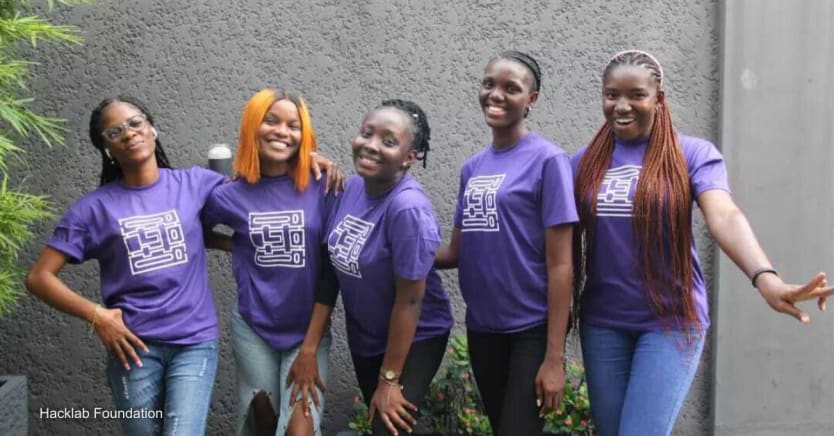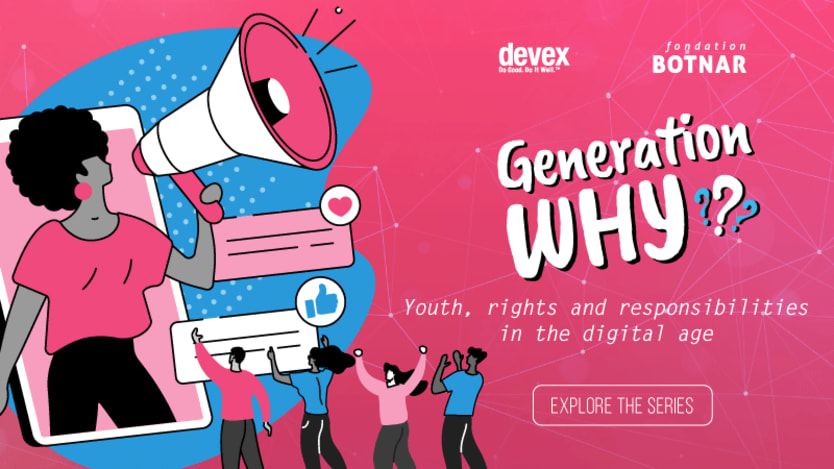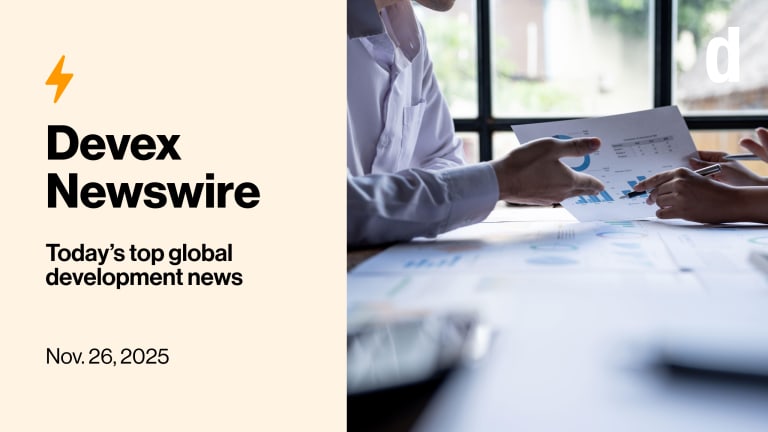
The digital technology sector is set to take off in many African countries over the next few decades. A June report from entrepreneur network Endeavor estimates that the continent’s digital economy is currently worth $115 billion — and expected to reach $712 billion by 2050.
Such a shift would signal big changes. Currently, less than a quarter of the people in Africa have internet access, compared with around half the population globally.
However, a Brookings Institution report predicts that the rate of internet use could rise to nearly 80% in sub-Saharan Africa by 2030, setting in motion growth that could make the continent a “global powerhouse.” In most of the region’s countries, the internet is more readily accessible through mobile phones rather than fixed broadband, and the number of people using these mobile services has been rising steadily since 2014, with 20 million new users coming online in 2020 alone.
Addressing a deepening digital divide
Yet many citizens still lack the resources and skills needed to get online. Amina J. Mohammed, the deputy secretary-general at the United Nations, has warned of an increasing digital divide becoming “the new face of inequality” in the 21st century.
In addition to a lack of the essential infrastructure necessary for access, the internet itself comes with risks.
“We have seen digital technologies become vehicles for the spread of misinformation, hate speech, online child abuse, and violent extremism,” Mohammed said in April 2021 during a U.N. event on digital cooperation and connectivity. She added that a “common effort” is required to provide protection for users and consumers and to “connect everyone with a positive future.”
Some young entrepreneurs in Africa are trying to lead the way by improving access to both the technology and the skills needed to reap the benefits of the internet, including job opportunities in an increasingly global market.
Foster Awintiti Akugri, an entrepreneur from Ghana, set up the Hacklab Foundation in 2015 when he was still a computer science student. As well as an annual “hackathon,” which brings together the tech sector and development professionals to discuss issues that can be solved through technology in low- and middle-income countries, the nonprofit offers workshops and training for young people to help them break into the tech workforce.
An additional Hacklab initiative is aimed at women who have already embarked on a career in science and technology, providing access to networking and other opportunities to boost career growth and help encourage women to stay in a sector that has a significant gender gap. The organization also offers a program called Hacklab Junior for children and teens, who can attend robotics competitions or receive online lessons in coding.
Akugri told Devex that he wants to launch Hacklab, which is based in the Ghanaian capital of Accra, in other countries as well. Hacklab events and workshops will be held in Nigeria, Kenya, Rwanda, Uganda, and Zambia this year, he said.
“Hacklab Junior teaches children how to code, how to assemble robots, how to program robots and microcontroller boards. And from there, they are able to use these skills in other areas,” he said.
According to Akugri, the program encourages participants to use what they’ve learned to build momentum for future opportunities, telling them to “put it into practice, build a solution, pitch to us, win a prize, win an internship opportunity, or win a job opportunity.”
He argued that this kind of education is critical for addressing the skills gap, as most companies will soon be using some kind of digital technology to support what they do. The International Finance Corporation estimates that over 230 million jobs in sub-Saharan Africa will require digital skills by 2030.
“My motivation is really driven by the anticipation of Africa becoming the youngest and largest population in the world, and that there’s going to be a global shift in talent and workforce demand from Africa to power the next [digital] revolution,” said Akugri.
Reaching the unconnected
Hacklab currently focuses on groups of people who are already online or those who have had some exposure to digital technology.
“We acknowledge the fact that there's a growing gap — and that for every person in training introduced to these things, there’s more of a gap between them and a person who lacks the infrastructure and resources to even get close to having foundational knowledge,” Akugri said.
To expand access to its programs, one of the organization's next projects is an “inclusion bus” that will act like a mobile library by bringing information and communications technology, or ICT, to remote community schools.
“It will be a ‘maker space,’ ICT lab, and library. And it will allow for less privileged communities to leverage this bus as a shared resource,” Akugri said.
The plan is for the bus to be shared by clusters of six schools in Ghana in close proximity to each other, on a weekly rotation. An initial pilot is planned to last a year and is expected to reach around 1,000 children across the cluster, but Akugri said he hopes this figure will be multiplied with the addition of more buses.
Reaching rural women in Nigeria
Hafsah Jumare discovered the extra level of effort required to ensure inclusivity when she launched the startup CoAmana in 2018. She had quit her management consultancy job in the Nigerian capital of Abuja to do something with more of a social impact, she said, but reaching the rural women whom she wanted to support turned out to be a difficult task.
The startup uses a mobile app, as well as a text messaging service and a call center, to connect farmers and small-business owners with market information and buyers. ComAmana acts like a one-stop shop for business owners to access financial services, such as credit and insurance.
However, Jumare noticed early on that few of CoAmana’s users — only 11% — were women. “We realized we had natural demand patterns [causing this], so we had to specifically tailor a strategy for women to change it. Now about 80% of the users are women,” she said.
Reaching more women required investment. “It takes a long time to build trust. And it required a lot more training [for these users], because men are a bit more exposed to technology,” Jumare told Devex.
Instead of expecting women to simply begin using the app on their own, CoAmana hired more call center agents to answer questions about the app and its functions, as well as more field agents to go out and directly explain the service to women in rural areas.
The most important element of such a process is “not disrespecting what already exists,” said Jumare. “We don’t come in and say, ‘Hey, here’s new technology.’ We help support the supply chain networks that already exist and relationships between farmers that have been built over thousands of years,” she said.
Jumping on the digital skills train
Closing the digital divide is not only about access to technology. Ensuring that individuals — especially those in the remotest areas — have digital skills and literacy to take advantage of existing technology is equally important. Some development institutions have recognized this need — and in the past few years, a crop of new initiatives have sprung up.
Examples include a “Digital Enquirer Kit” launched by German development agency GIZ in January on a free learning app named atingi — developed through a partnership between GIZ, the German Federal Ministry for Economic Cooperation and Development, and the Smart Africa Alliance — that aims to provide free access to digital learning in African countries. The training covers everything from identifying misinformation and using privacy settings to “tackling online gender-based violence.”
Larger initiatives include imaGen Ventures, which runs large youth competitions in several low- and middle-income countries and encourages participants to find solutions to social and environmental issues in their communities. It then connects these planned ventures with grants, seed funding, and mentorship opportunities. Since 2018, it has reached over 15 million young people through these competitions.
Another example is the Yoma digital marketplace, which was launched in 2020 and connects young people in Nigeria, Burundi, and South Africa with training opportunities, such as courses in data analytics, project management, and information technology support.
Both initiatives are part of UNICEF’s Generation Unlimited, a platform that describes itself as the “world’s first Public-Private-Youth Partnership” and asks youth organizations about what they need in terms of education and resources. It then pairs those requests with either funding or expertise in the public and private sectors.
“The platform is aimed at finding ways to provide the right skills and training for the 1.8 billion people aged 10 to 24 on the planet right now to thrive in the future. And it focuses on digital and green jobs,” said Nadi Albino, the head of partnerships at Generation Unlimited.
“The digital divide is going to close itself eventually because the telecommunications companies are aggressive and want to expand as much as they can,” Albino added. “The issue now lies in the ability of young people to be able to utilize that platform most effectively for their own growth and to contribute productively to the communities that they're in.”
Visit the Generation Why series for more coverage on how we can ensure the digital space advances the rights of all young people and leaves no one behind. You can join the conversation using the hashtags #DevexSeries on #DigitalRights.









